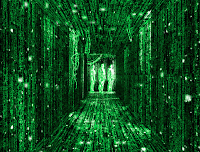Are we doomed to lose ourselves in the collective?
(c) 2012 by Tom King
There are two basic routes science fiction authors take in developing future utopias/dystopias.
Collectivism/Social Justice/Surrender the Will:
One popular idea is borrowed from Easter Religions like Buddhism and favors an ultimately collectivist penultimate civilization. This future nirvans take three possible forms - all of them either unlikely or unpalatable.
The first is the "sea of thought" utopia. This future pictures a world in which, through some machine initiated device all humans are eventually absorbed into a sort of galactic thought-mush where we are vaguely happy being part of the collective consciousness and unhappy should we emerge from the sea of souls to spend even a short time as a lonely individual. I rather prefer being an individual, myself, but then I never saw the point of psychedelic drugs back in the 60s either.
The second collectivist vision is "the machine facist state". In this cheery scenario, we either become or are replaced by the machines or by vast magical superbrains and all blindly serve the collective. Some believe this will be a machine collective, others an organic one. Either way I want none of it. I've always sort of had a problem with authority anyway.
The third collectivist vision is the most nonsensical - the Star Trek Next Generation universe. In this fantasy, everyone's needs are taken care of somehow - we know not how - and everyone runs around doing his job simply because he or she wants to. And since their needs are automatically taken care of, they magically become hard-working, creative workers who are fulfilled by their jobs. What these authors portray is the airy socialist nirvana that relies on the myth that ordinary folk just need a certain number of needs met along Maslow's heirarchy to trigger their inner altruism. It's a fantasy which posits a state very like the Christian idea of heaven, but without the bother of having to put up with a pesky God or even the need to submit to some sort of change in nature like conversion or death and rebirth.
It doesn't matter to these cheery optimists that all attempts to create these sorts of workers' paradises have heretofore failed miserably and often violently because inevitably too many people choose to embrace their self-centered wolf-like nature and tend to instead, run about slaughtering all the nice people in order to win power over them all. Collectivist governments are notoriously vulnerable to megalomaniacs.
Ayn Rand/Hard Capitalist/Free Will:
 This vision of the future universe posits either a rough wild-west flavored galaxy like Poul Anderson's Nicholas Van Rinjh Trader to the Stars adventures and Joss Whedon's Firefly or to an alternating descent into self destruction and anarchy followed by a rise to cultural greatness. Usually the no hope stark anarchy dystopias are written by people who favor the magical Star Trek collectivist vision who want to warn people what's in store for them if they don't adopt the collectivist view. These stories actually should be considered part of the collectivist literary canon as examples of morality tales. Phillip K. Dick wrote this kind of stufff which even post-modern Hollywood had to cheer up by adding a little mildly happy ending to his dark tales.
This vision of the future universe posits either a rough wild-west flavored galaxy like Poul Anderson's Nicholas Van Rinjh Trader to the Stars adventures and Joss Whedon's Firefly or to an alternating descent into self destruction and anarchy followed by a rise to cultural greatness. Usually the no hope stark anarchy dystopias are written by people who favor the magical Star Trek collectivist vision who want to warn people what's in store for them if they don't adopt the collectivist view. These stories actually should be considered part of the collectivist literary canon as examples of morality tales. Phillip K. Dick wrote this kind of stufff which even post-modern Hollywood had to cheer up by adding a little mildly happy ending to his dark tales.Isaac Asimov, something of an intellectual elitist himself, posited a secret society of elite smart people called the Foundation who figure out how to mathematically manipulate history. Even then Asimov, a keen student of history, only allowed his mental supermen to roughly poke and prod history along in a general direction that kept humanity's corrupt leaders from killing too many people in the process. He recognized that human nature tends to overpower central planning in the end.
These more conservative views of the future tend to be held by people with a working knowledge of history and of the ebb and flow between anarchy and regimentation that countries undergo throughout their histories.
The God Is In Charge View:
I favor another view - the idea that there likely is a powerful consciousness, an interdimensional being if you will, who is behind the design and upkeep of this particular universe. I believe He's using the earth as a laboratory in which to grow decent people who have free will, but who choose to reject doing evil because they've seen enough of where that leads.
It makes sense He will aid them in transforming into the people they choose to be and will at some point harvest the product of His vast social experiment, provide them some sort of durable, everlasting housing for their consciousness and then use those trustworthy individuals to create the sort of utopian universe the Trekkies would like to see happen -only without the Borg and where Klingons and Romulans were nice people.
I don't see where that's such a preposterous idea either.
Just one man's opinion.
Tom King














No comments:
Post a Comment